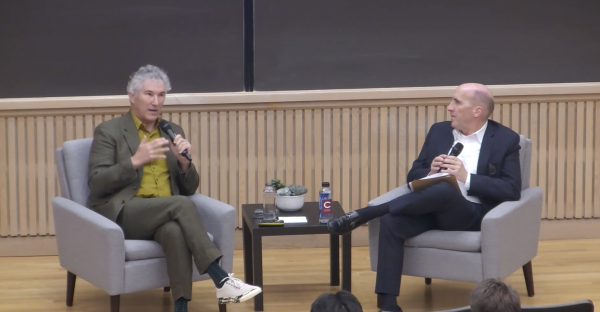Debate Society Goes Head to Head in Donovan’s Pub
In response to recent Diversity Week proceedings, the Debate Society hosted an event at Donovan’s Pub on Tuesday, September 22. Four society members debated the proposition, “This house believes that minority political figures have a responsibility to promote the issues that are important to their minority group,” in front of an audience of students, debate team members and staff. Once each of the debaters brought their arguments forward, the floor was opened to the audience to respond to the claims made and to voice its own opinions.
President of the Debate Society, junior Austin Schwartz, intended for this to be the first of many similar events.
“Part of the goal of the Debate Society is to bring together the community and create discussion,” Schwarz said. “That is what we are trying to do with this event as part of Diversity Week, and we are planning on putting together other similar events.”
For a first attempt at such an event, the executives expressed hope for an audience of 20 to 30 people. Although this goal was not met, the group that did assemble was a captive audience and a number of audience members came forward to voice their own opinions. Although the discussion focused on a controversial topic that some attendees were passionate about, the tone of the evening remained amicable.
The debate was prefaced by a brief address from Vice President and Dean of Diversity and Associate Professor of Africana and Latin American Studies Keenan Grenell, who expressed excitement about how this year’s Diversity Week events played out, particularly the keynote speech by Michael Steele.
“I think it is inspiring to know that students want to explore the things that were communicated by Michael Steele,” Grenell said. “These issues are important. They are American issues, and this was a very intelligent way of addressing them.”
Schwartz, who debated the proposition with teammate junior Michael Cohen, also felt it went well, and succeeded in its objective of beginning to open up discussion on campus.
“This evening is not about winners and losers,” Schwartz said.
The issue of the debate ultimately centered on an argument over whether or not racial conditions would improve if minority politicians acted in a manner beneficiary to their minority group.
Side proposition argued for this notion, suggesting that minority politicians should feel a moral imperative to try to help their minority groups to level the political.
On side opposition, it was argued that in order to avoid perpetuating identity politics, minority politicians should break away from that tendency and, just like every majority politician, be responsible to his or her own constituents.
A few students in the audience remained after the debate was closed to discuss what they heard. Junior Stephen-Anthony Alleyne at first worried that the event might be boring, but announced at the end that he was pleasantly surprised.
“I thought it was pretty good,” Alleyne said. “I started leaning towards side proposition, but it’s an issue that you can’t really form an opinion about in one night, you have to talk to a lot of different people. This just started to get you thinking.”
Coordinator of the Colgate Speaking Union John Adams, who is in charge of the Debate Society, also had some positive reflections of the event.
“I thought it was a good debate. It’s not so much of a specific issue as a general question,” Adams said.
In response to a remark made on the pleasant atmosphere of the evening, even in the presence of such conflicting viewpoints, Adams merely chuckled.
“What people don’t realize is that there are a lot of really nice ways to do conflict. You can disagree quite nicely and fluidly,” he said.




